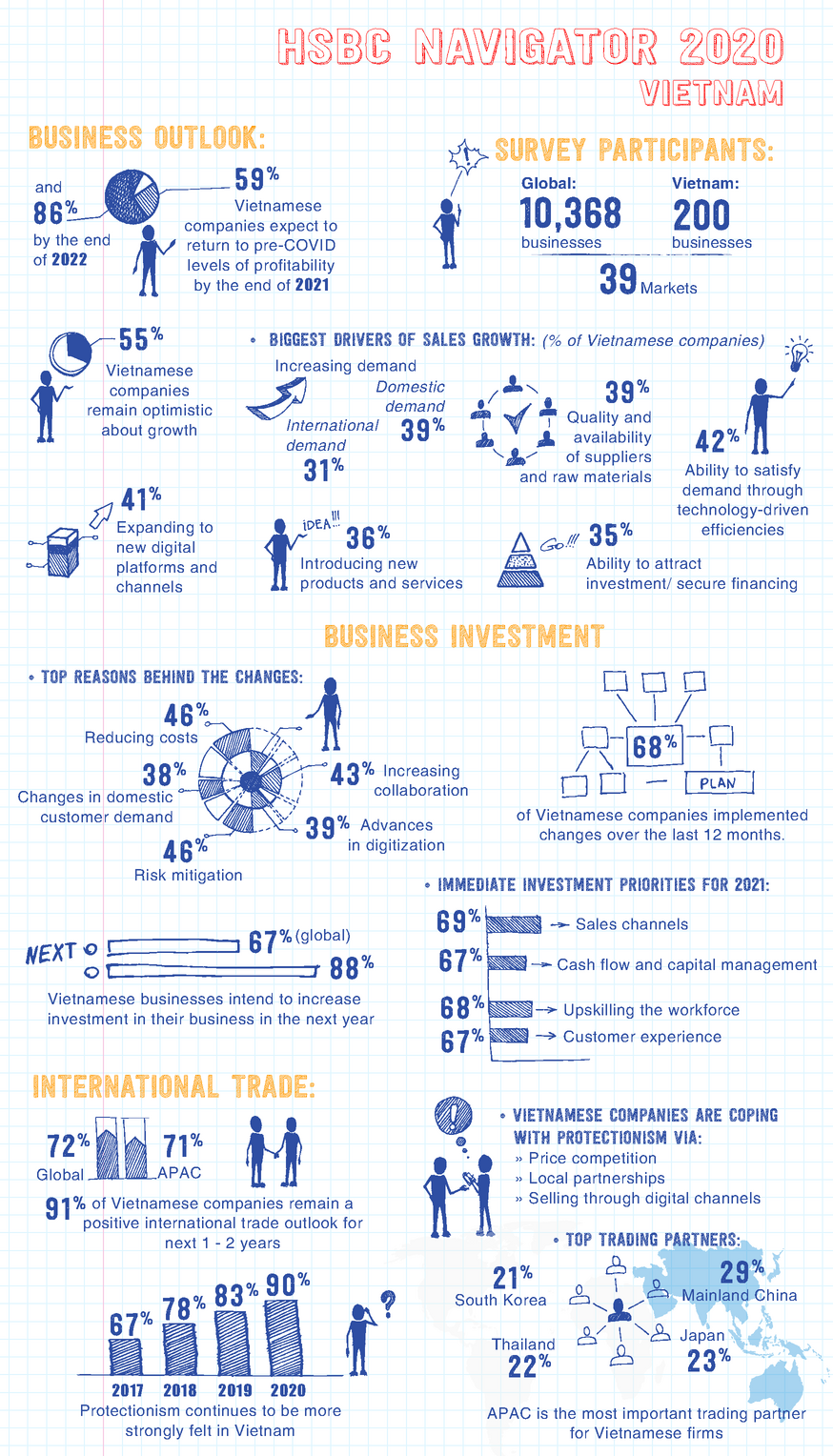Vietnam companies among world’s most optimistic amidst Covid-19: HSBC
More than half (55%) of Vietnamese companies remain optimistic about growth, well above the global average (29%).
In a year when the world has been battling a major global pandemic, the majority of Vietnamese companies have adjusted to the ‘new normal’ and are looking ahead with far more optimism than their counterparts elsewhere in the world.
That is according to HSBC’s Navigator report – ‘Now, next and how for business’ – an annual survey of international trade around the world, which surveyed over 10,000 companies in 39 countries and territories across the globe, including 200 companies in Vietnam.
| Source: HSBC. |
It is partly testament to Vietnam’s success story in combatting and eliminating Covid-19 that more than half (55%) of Vietnamese companies remain optimistic about growth (compared to 56% last year), well above the global average (29%), stated the report.
Although not everyone remains so upbeat – year-on-year, more companies are pessimistic or ‘expect to shrink’ (26% over just 4% in 2019).
Covid-19 has also taken a toll on growth expectations, with significantly fewer Vietnamese companies expecting higher growth of more than 5% (66% in 2020 versus 92% in 2019).
But overall, Vietnamese companies have been less impacted by the pandemic than global counterparts, with close to three-fifths (59% compared to 45% globally) expecting to return to pre-Covid-19 levels of profitability by the end of 2021, and more than eight-in-ten (86%) by the end of 2022.
‘Vietnam’s remarkable resilience and effective response to the pandemic has been a major contributor to increased optimism. Unlike many other countries, from a purely domestic economy perspective, in the second half of the year, Vietnam is broadly back to a ‘business as usual’ environment,’ said Tim Evans - Chief Executive Officer of HSBC Vietnam.
‘Needless to say, different sectors face their own particular challenges, but what most Vietnamese companies share in this survey, is a recognition that they will need to invest in order to capture future opportunities. Companies feel that by up-skilling staff, embracing new technologies and increasing their efficiency, they will be in a position to achieve their future growth plans,” he noted.
Looking on bright side of international trade
Vietnamese companies also remain more positive on international trade than their global peers (Vietnam: 91%; global: 72%), in spite of the majority of businesses feeling that international trade has become more difficult. Encouragingly, Vietnamese companies are more positive about their prospects for future international trade and they will continue to look for expansion in other markets, stated HSBC.
Protectionism continues to be strongly felt with 90% of Vietnamese companies thinking that it is increasing. Price competitiveness, local partnerships and selling through digital channels are the key strategies to combat it.
For global trade, Asia Pacific and Europe, as well as mainland China, remain viewed as the most important partners for Vietnam companies.
Optimism in Vietnam will have been further buoyed with the signing of the Regional Comprehensive Economic Partnership (RCEP) on November 15. The agreement has been heralded as the beginning of a new era in which Asian countries (including all ASEAN nations plus Australia, China, Japan, South Korea, and New Zealand) will play a major role in setting the standards that will enable the next round of global growth.
“RCEP has brought 15 Asian nations together to help drive the agenda around increased cross border trade. As one of the region’s fastest growing and most dynamic economies, Vietnam has much to gain from this far-reaching free trade agreement (FTA),” said Tim Evans.
“Offering faster, more efficient and tariff-free access to a market of some 2.3 billion people, the RCEP can help local firms in Vietnam increase exports and attract high-quality goods for their consumers. This time next year, we all hope that levels of optimism have returned to the global economy,” he added.













